I am very fortunate to be able to attend a number of Education Conferences each year. This offers me a perspective of education conferences that is not afforded to a majority of educators. When one considers the total number of American educators compared to the total attendance at these conferences and then factor out the people who repeatedly attend each year, it is easy to see that most educators do not get to these national conferences. That is a shortcoming I believe that hurts the profession. There is much to be learned and shared at these conferences that can make a difference to an educator.
Of course many of these conferences are so vast that it is difficult to report on the whole conference when one can only experience a small part of it. It brings to mind the five blind men trying to describe what an elephant looked like based on only one part of the elephant that each had physical contact with. Each description was completely different, and not one accurately described the whole elephant.
My last three conferences were Educon, FETC, and TCEA, wonderful conferences all. In each of these I met with many connected educators and participated exclusively in sessions of discussion or panel-driven discussion. I find these types of sessions more in line with what suits me in learning. I feel that I can personalize the sessions for my needs, and I can even participate in the content of the discussion personally becoming a part of the learning. Educon of all the conferences is the one conference that focuses on these types of sessions. Of course that would make it my conference of preference.
The other conferences generally depend on “sit and get” PowerPoint demonstrations, or “bells and whistles” software presentations. There will always be a need for these sessions, but I question the balance, or lack of balance, they have when compared with discussion sessions at any given conference.
The glaring deficiency in any session is that it must be submitted and approved 8 to 12 months in advance. How does that maintain relevance? How is the latest and greatest in education even represented at these conferences, unless it is discussion? Discussion can be more timely than any presentation that is eight months old.
Discussion adds the ability to deal with topics of pedagogy and methodology as opposed to just the mechanics of a lesson. Discussions of education that do not take place in school buildings can take place with educators of varied experience to share and elaborate. This is the fodder for reflection. Reflection goes a long way in changing the way we approach things. It often prompts change and promotes reform.
I believe that the success of the Edcamp format where discussion and collaboration are the focus, and the popularity of real-time chats on Twitter and Google Hangouts are all indicators of change. Educators are personalizing their learning in larger numbers. This may be a trend or something bigger. Whatever it is, we need to adjust the way conferences are providing what educators need as a profession.
As a connected educator, I loved being with and sharing ideas and discussions with other educators with whom I am connected. Our conversations were not the same as those of unconnected educators at these conferences. As I talked with educators who were not in collaboration with others on a regular basis, I found a need to define and explain things to them that are discussed and understood online by connected educators daily. I am not saying that these unconnected educators are not good teachers, but maybe not as informed as a professional needs to be, or as relevant as a professional could be. We are in a profession that deals with information and learning. We need to be relevant in two areas, content and education. Online collaboration enables that to happen more efficiently and on a constant basis. These online discussions are carried further in a face-to-face setting of a conference. Those not involved with online collaboration are often playing catch up in the discussion. A worse alternative is that they withdraw from involvement in the discussion altogether.
Technology has moved collaboration from a way of learning that only happened in a limiting face-to-face setting, to one that takes place anywhere at anytime breaking down the previous borders of time and space. For educators not to take full advantage of this new-found ability is a missed opportunity. We need to support, enhance, and encourage collaboration in all of its forms, online and face-to-face. Ideas that are born at conferences can be continually evolved online. The discussion need no longer end after the closing keynote. Ideas that are born online may be expanded and improved in the face-to-face collaboration of the conferences. We don’t need the opening keynote to start the thinking and connecting. We are professional educators who need to do a better job educating ourselves as educators. If we are to better educate kids, we need to better educate their educators.



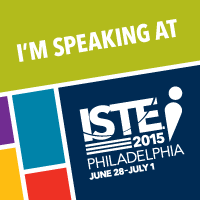


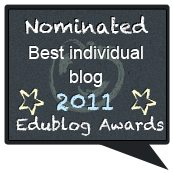
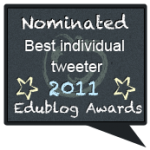
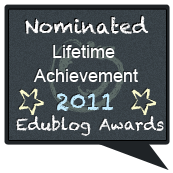

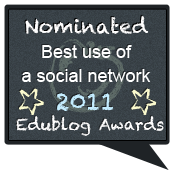
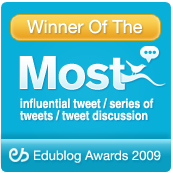
Reblogged this on The Sup's Scoop and commented:
Tom nails it, again.
Conduct a search for Open Space and World Cafe. I believe edcamp structures were borrowed from Open Space Technology. I believe OST is the best for providing access to authentic and relevant PD.
Thoughtful piece Tom as usual. Pondering the prospect that many people may actually prefer the “sit and get,” passive learning approach, to the more engaged form of information sharing you reference. Indeed, even on Twitter chats there is passive learning going on by “lurkers” who are the connected educator’s version of the “sit and getters.” As a veteran of talk radio I see parallels. In traditional talk radio circles, it’s generally known that the overwhelming majority of people who are part of the on-air conversations, participate as listeners not callers. Indeed, even the majority of passionate talk show listeners have never even attempted to “call in” and be part of the on-air discussion. I’m wondering to what extent this dynamic is in play in education conferences. Yes, education conferences, Twitter chats, Google hangouts and education radio programs and podcasts all bring educators together and enable robust conversations and active sharing… However, I suspect that there will always be a large group of educators who simply prefer to participate in the learning as listeners and spectators versus jumping into the center of the exchange. If this is true, then old-school education conferences are relevant and likely will be until human nature changes. Most importantly I suspect that it’s important to note that the educator who is inclined to be more passive and reflective can be as passionate and committed to growth and professionalism as the extroverted educator who has never heard a education topic being discussed that he or she didn’t want to comment on.. Thoughts?
Errol
I really can’t address that on behalf of all learners, but for myself I find real learning involves active participation in the process. I need to take ownership of it. I need to: challenge, test, expand, modify, accept, or reject ideas. I do not find that passive learning works for me. TED Talks are great and inspirational. I love to listen to them. I come away immediately inspired. The next day I can’t remember what the main points were. a week later it is but a memory of a pleasant talk that moved me. None of the details are left. I never engaged or challenged that speaker. As a listener, I was not taking ownership of someone else’s ideas. I may have liked it, but for the most part I did not get it. I did enjoy the moment however, and listened with interest. I guess for me listening and learning are not the same, although one usually needs to listen in order to learn, it is not the only factor in my process of learning. I need to do more. I would hope that others think similarly. Those are my thoughts, and now that we have engaged and explored this together, I have learned something.
Point well underscored Tom…. As you and I are in some ways cut from the same cloth, I understand how much engaging, exploring and challenging ideas results in deeper understanding, higher retention and even the discovery of more evolved and insightful perspectives through the process of dialogue. Indeed, as you point out, we are doing it right now. That said, you know that people have different learning styles. I can hear a concept and “get it.” My partner doesn’t really get it till she “sees” it. You don’t get it until you discuss it, challenge it, test drive it and choose to own it –Whatever works. Returning to your original point, and the main thrust of your blog post: Are education conferences relevant? I get that to those who prefer a more active learning approach, the answer may increasingly be no. However, I do think it’s important to acknowledge that our views are just two data points.So I think your blog post and this discussion are relevant and helpful – It certainly engaged me and stirred my thinking. Noteworthy closing thought. Some of the most powerful ideas by which we all live our lives were the result of one way communications -conveyed through books and embraced though private reflection. Indeed, some of the deepest learning for some occurs this way… again, different strokes.
Errol
One way communication also leaves us open to being a country ruled by Sound bytes. That is another reason we need to engage for critical thinking. Thanks Errol
Well said Tom.
Though I have waxed and waned over recent years about the continued value of attending face-to-face conferences following my discovery of the wealth of professional learning and collaboration that can be experienced in our ‘connected’ world, I am now seeing the relevance and benefit of continuing attendance at conferences.
Your point that so few of us tend to get the opportunity to attend face-to-face conferences though, highlights the incredible gains to be made by engaging in cyberspace. I totally agree with you that those not yet ‘connected’ are missing out on much. It is up to those of who have made this discovery to proclaim the benefits loud and clear.
It’s no easy task though to engage those who are not ‘on board’.
Reblogged this on evolvEDtech.
Insightful. Had a similar discussion while at FETC about what was being offered. Just about everything being offered in the sessions had already been covered in various edchats on Twitter. Found myself trying to find a session that would be a beneficial learning opportunity.
I would have liked to have had more discussions with other educators … a bit upset that I missed the FETC Tweet Up because I think making those real connections are important to the future of Education.
[…] that, but it can be personalized to your current learning needs. Tom Whitby recently posted about the relevancy of education conferences, and there has been amazing discussion on Twitter about the topic. It reminded me that the […]
[…] recently read a post by Tom Whitby, titled “Are Educational Conferences Relevant?” His post made me think about the true value of educational conferences. As a teachers […]
[…] Are Education Conferences Relevant?. […]
[…] I am very fortunate to be able to attend a number of Education Conferences each year. This offers me a perspective of education conferences that is not afforded to a majority of educators. When one… […]
[…] I am very fortunate to be able to attend a number of Education Conferences each year. This offers me a perspective of education conferences that is not afforded to a majority of educators. When one… […]
[…] This offers me a perspective of education conferences that is not afforded to a majority of educators. When one considers the … I believe edcamp structures were borrowed from Open Space Technology. I believe OST is the … […]
Hi Tom,
I completely understand your perspective. I also find that because I am a Connected Educator, most of the sessions I see at conferences are on topics that I am at least familiar with, even if I am not an expert on the topic, And I also want to see more educators become Connected Educators.
I do believe that traditional education conferences do have value, however. Teachers are at varying stages in their degrees of knowledge and “sophistication” with regard to education technology and the traditional “sit and get” sessions can be valuable for those teachers who are not yet ready to become Connected Educators. I had a very “tech-fearful” teacher at my school who took a BIG step out of her comfort zone by attending FETC, and who came back inspired to make changes in her teaching. This is a teacher who is not ready to become a Connected Educator, but who has changed her mindset regarding education technology because of the “sit and get” sessions she attended. This is something to celebrate! It is my hope that she will become a Connected Educator as her comfort level with technology grows. I know another educator who has been lurking on Twitter for a few months now, but was inspired by the people she met at FETC to start participating more actively in Twitter. Traditional conferences can be a great way to expose teachers to the Connected Educator community through the use of conference hashtags. Every educator who takes steps to become connected represents a victory – for their students and for the education profession in general.
I agree that discussion oriented sessions are more relevant for me, but I have attended great lecture sessions and found them valuable. I also have found that the in-person connections I make with other educators are even more valuable than the sessions I attend. So I still think that there is great value in traditional conferences and see them as an opportunity to bring other educators into the Connected Educator fold.
[…] Are Education Conferences Relevant? | My Island View : Are Education Conferences Relevant? Thoughtful post comparing education conferences with Edcamp and Twitter chats. […]